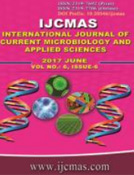


 National Academy of Agricultural Sciences (NAAS)
National Academy of Agricultural Sciences (NAAS)

|
PRINT ISSN : 2319-7692
Online ISSN : 2319-7706 Issues : 12 per year Publisher : Excellent Publishers Email : editorijcmas@gmail.com / submit@ijcmas.com Editor-in-chief: Dr.M.Prakash Index Copernicus ICV 2018: 95.39 NAAS RATING 2020: 5.38 |
Bacterial resistance to antibiotics represents one of the most significant global health challenges of this century. Although the role of commensal bacteria in providing a reservoir of antibiotic resistance has been acknowledged for some time these bacteria have not been studied extensively. The purpose of the present paper is to prospectively determine the presence of Multi drug resistant E. coli in commensal fecal flora of Newborns who are not receiving any antibiotics. After receiving parental consent 30 neonates less than 1month of age of either sex, hospitalized in the pediatric unit of NKP Salve Institute of Medical Sciences, not recently exposed to antibiotics were enrolled along with 30 neonates less than 1month of age admitted in NICU on treatment with various antibiotics. E. coli isolates from Stool samples were identified by standard biochemical tests & Antibiotic susceptibility was tested by the Kirby-Bauer disk diffusion method on Mueller-Hinton agar. The Antibiogram of both the groups was compared to determine whether antibiotic therapy results in increase in the percentage of drug resistant E. coli population in the commensal fecal flora. In the newborns, who were not given antibiotics, resistance to Ampicillin was 100%, followed by Co-trimoxazole 27(96.42%). Highest sensitivity was observed to Amikacin 24(85.71%) followed by Gentamicin 16(57.14%).60% isolates were resistant to more than 3 drugs. In Newborns who were on various antibiotics, 100% resistance was seen to Ampicillin and Ceftriaxone followed by Co-trimoxazole 27(96.42%). Highest sensitivity was observed with Chloramphenicol 13(46.42). 11 isolates (39.28%) were sensitive to Amikacin and Tetracycline each. 90% isolates were resistant to more than 3 drugs.
 |
 |
 |
 |
 |